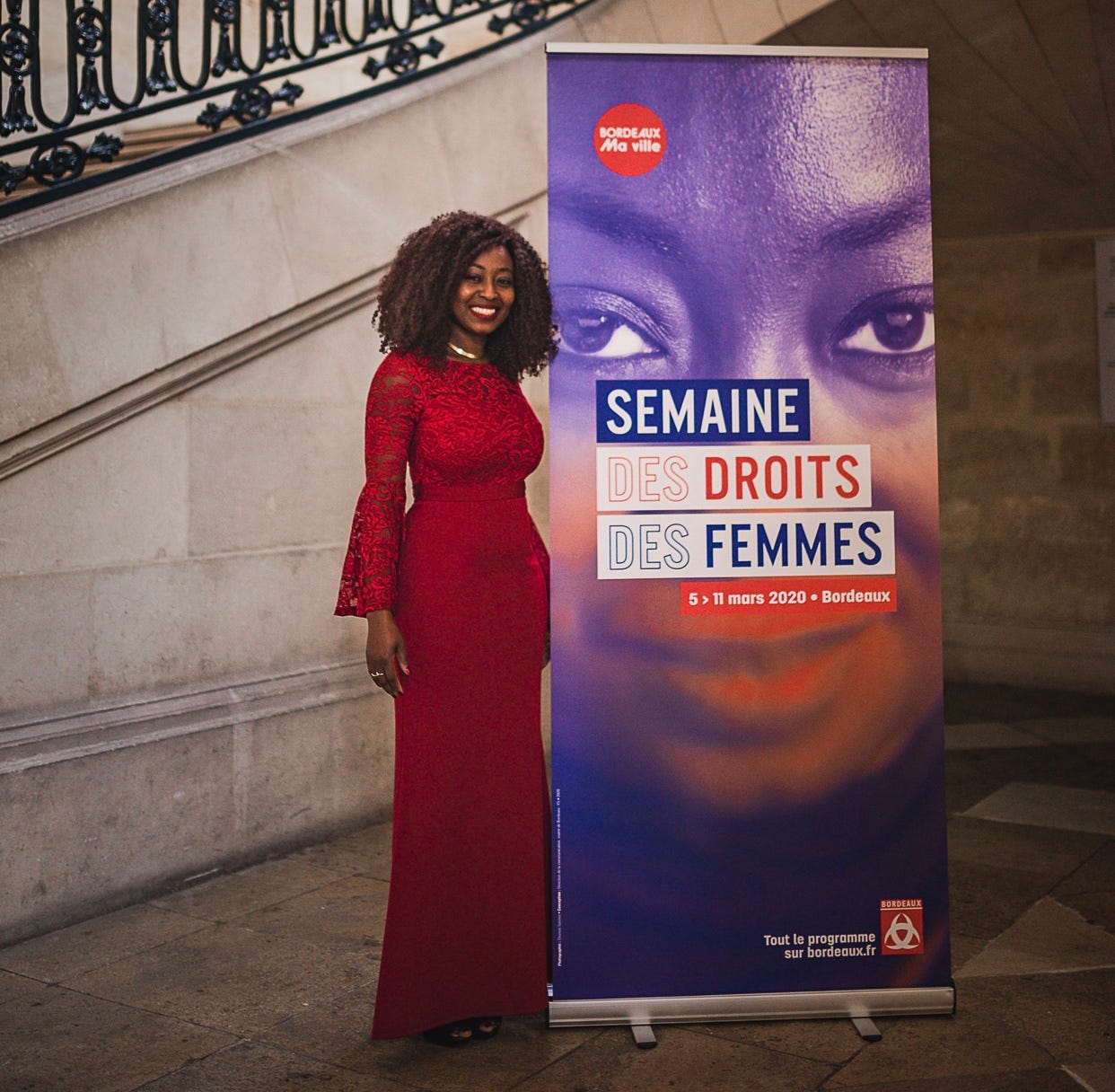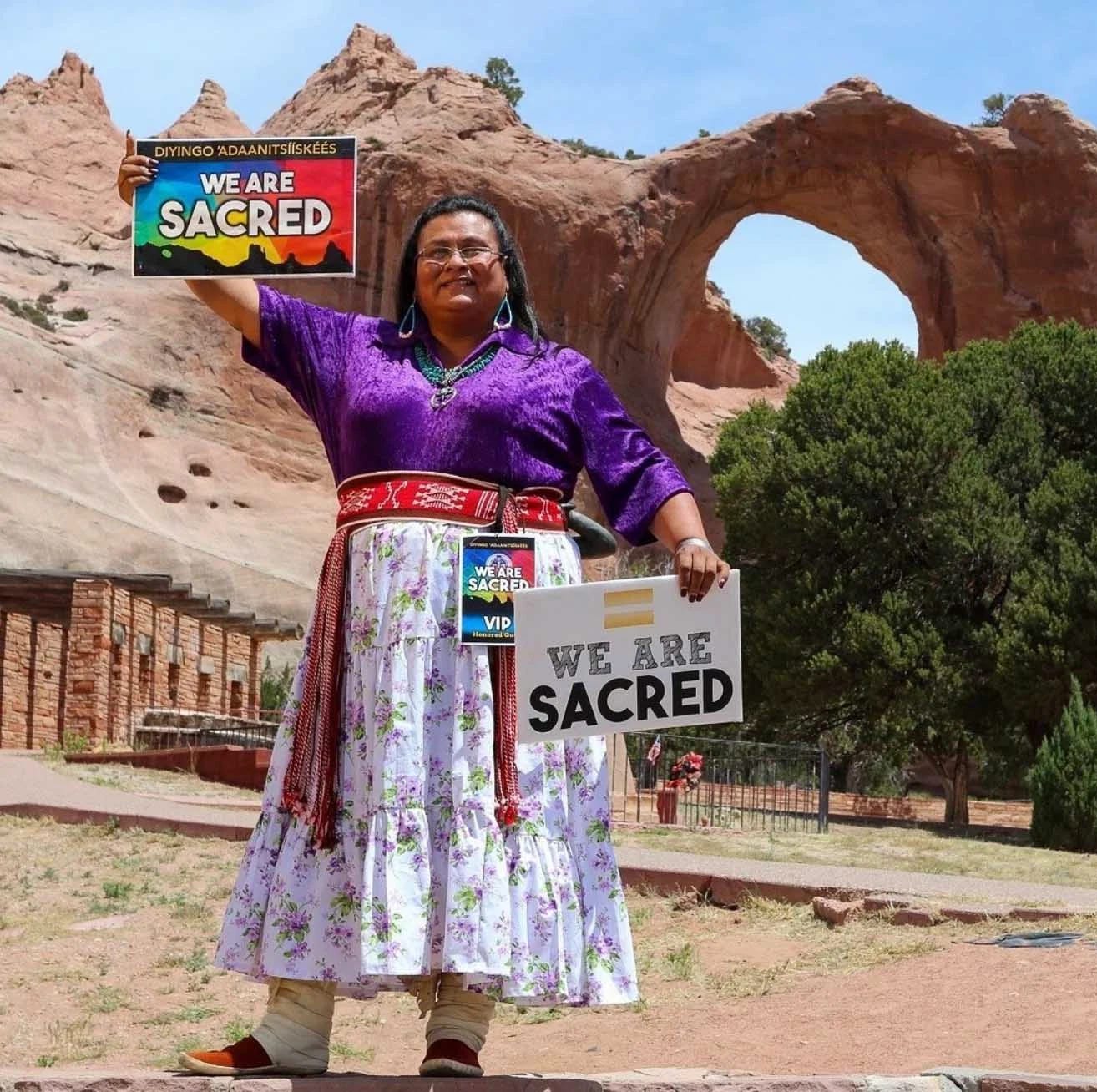Global Roundup: Fighting FGM, Indigenous Climate and Transgender Activism, Challenging Stigma and Taboo with Art
Compiled and written by Inaara Merani
Photo courtesy of Marie-Claire Moraldo Via Global Citizen
At a young age, Marie-Claire Moraldo forcefully underwent female genital mutilation (FGM) in northern Côte d’Ivoire where she was raised by her maternal grandparents. Her mother was heavily opposed to FGM and demanded that her parents did not subject her daughter to it, however this was unfortunately not the case. At the time, she did not understand what happened to her or how it would affect her life as a woman.
I don't blame the people who did this to me, because I'm aware that traditions carry a lot of weight, and I know that you can't rebuild yourself from resentment. So I kept pushing on after that, and it didn't change anything in my life. I even came to believe that it was normal. In that area [northern Côte d’Ivoire], everyone takes part in female circumcision — Christians, Muslims, Animists, and so forth.
It was in 2002 when she moved to the capital Abidjan to study that she learned that girls were not subjected to genital cutting in the south of her country. She understood that it was not “normal” and that what she had been taught to believe was a tradition not to be questioned was not a “tradition” everywhere in Côte d’Ivoire.
In 2016, after she moved to France, she met a man whom she loved, but ultimately did not pursue the relationship because she was ashamed about what she had been subjected to in her childhood. Later that year, Moraldo underwent reconstructive surgery in Paris; she considers this to be her second birthday because this is when she made peace with herself and others.
Moraldo created the Red Orchids Association in March 2017, an organization committed to fighting against FGM. Their work is centred around prevention and awareness campaigns, holistic support for women during their emotional and physical recovery, health training, professional and social (re)integration, and rehabilitation for those who were formerly involved in the practice. There is also a multitude of professionals who support this initiative including: gynecologists, surgeons, general practitioners, sex therapists, psychologists, psychosocial therapists, social workers, lawyers, and more.
FGM is a difficult experience to endure, and it has a lasting impact on women and girls. This procedure is demeaning and appalling and is just another example of the patriarchy’s attempt to control women’s sexuality and police women’s bodies. Everyone must continue to raise awareness to this important issue and continue to fight for the rights of these women and girls.
Today, I am a partner and a fulfilled mother. I would like to tell all victims of female genital mutilation or other forms of violence in the world that it doesn’t have to define your life. I would like to tell them that they can get through it, that they can make sense of what they have gone through in their lives, because they must build on these painful experiences to create a happy life that meets their deepest expectations.
———————————
Bernadette Demientieff is leading the fight to save the Arctic wildlife refuge. For Demientieff, the Arctic has always been her home and the horrors of climate change have been a longstanding, devastating reality. Demientieff was born and raised in Fort Yukon, Alaska and is a member of the Gwichyaa Gwich’in First Nations band. The Gwich’in people have lived in harmony with the Porcupine caribou herd for over 40,000 years. She notes that her upbringing has laid the groundwork for her lifelong work in climate advocacy.
Demientieff now serves as the executive director of the Gwich’in Steering Committee, a group of Gwich’in leaders speaking out against the impacts of climate change in their communities. The group’s latest fight is to protect the Arctic National Wildlife Refuge (ANWR), the summer home of the Porcupine caribou, from oil drilling. Recently, the Trump administration announced that it would push to lease parts of the refuge to oil companies before President-elect Joe Biden enters office on January 20, 2021. Biden has pledged to block drilling in the area, however this fuckery by the Trump administration will pose a serious threat to this process.
We are spiritually and culturally connected to our land, to our water, and to our animals…That’s our survival…This is our homeland. How would you like it if I walked into your house and started doing whatever I wanted to do? - Bernadette Demientieff
Demientieff doesn’t see herself as an environmentalist or an activist, but as a mother and grandmother with a responsibility to the land that raised her.
Despite the setbacks, Demientieff and other members of the Gwich’in Steering Committee will continue to speak out against the impacts of global warming and the possible actions of the U.S. government. She draws strength from her ancestors, whose presence she feels in her home in the Alaskan wilderness.
———————————
Freben Crew has been receiving well-deserved praise for speaking out against the practice of ghost marriages in rural China. This group is a student-based street dance club in Guanxi.
Ghost marriages, referred to as a “yinhun”, are a centuries-old tradition where a dead “bride” and “groom” are buried together due to a superstitious belief that unmarried souls need comfort and company in the afterlife. While this is a cultural practice, there have been cases where women have been murdered and had their bodies sold to be part of the ghost marriage tradition. In 2016, a man in Shaanxi, China was found guilty of murdering two mentally disabled women and selling their bodies to take part in a ghost marriage.
This performance told the story of a young girl who was coerced by her family to partake in a yinhun and marry a corpse. Her movements and expressions conveyed a story of a woman who was strangled to death just so she could marry a deceased man, and so her father could receive a sizable dowry. After the video went viral last week, many individuals came forward and shared stories about rumoured ghost marriages in their hometowns and elsewhere.
We dare to throw out the dregs of our culture, and use an art form for ironic criticism. This is cultural confidence
Frebel Crew, like many other performance troupes, is using their art and their platform to spread awareness about important social messages.
The practice of ghost marriages is often not talked about and it should be! Femicide is taking place all over the world, in many different forms, and it is important that people continue to shed light on this issue. This chilling, yet heartbreaking performance is worth the watch.
Video link: https://weibo.com/u/7004713361?from=feed&loc=nickname&ssl_rnd=1606196473.657&is_all=1
—————————-
Diyingo ‘Adaanitsíískéés (We Are Sacred) Via autostraddle
Mattee Jim is a Navajo trans woman who is part of the Zuni People Clan and born for the Towering House People Clan. She identifies as Diné, a term which members of the Navajo nation use to identify among themselves. She currently works at the First Nations Community Healthsource, ensuring that Native communities have the resources for HIV prevention, especially during the Covid-19 pandemic; Mattee has been doing this work for decades.
Mattee began to identify as trans when she was 27 years old and began working with the Coalition for Equality in New Mexico in the late 1990s. This organization has been working towards a reality of equity, full access, and sustainable wellness for LGBTQ New Mexicans. Prior to working with the Coalition, she had never heard the word “transgender”.
From what I’ve learned growing up, the elders would tell us that we’re special people,..A family was blessed to have someone in their family who was LGBTQ. The riches were the knowledge they knew, the roles they played, the tasks they do - Mattee Jim
While Stephanie Byers of the Chickasaw nation has made history this year as the first Native trans person to be elected to office in the United States, Native trans youth rarely have the stability to become politically engaged.
For Native trans women, two phenomena shape their lives: the ongoing genocide of Native people and the attack on trans bodies. Trans Day of Remembrance and the report on Missing and Murdered Indigenous Women, Girls, and Two-Spirit People (MMIWG2S) are just two examples of community-led initiatives meant to track disappearances of Native people, however many Native trans communities end up tracking their own community’s survival because they feel they cannot rely on the government or the media.
The Native trans community has long been rejected and neglected by the American mainstream, and the fight for equality is long from over. Mattee embodies the world that colonizers have tried to eliminate, and manifests the trans wisdom that her ancestors celebrated. Her work reminds us that it is our duty to remember.
—————————-
Protesters celebrate after listening to a judgment during a rally demanding the abolition of abortion law outside of the Constitutional Court in Seoul, South Korea, April 11, 2019. © 2019 AP Photo/Lee Jin-man Via Human Rights Watch
Recent news of a celebrity in South Korea giving birth after in vitro fertilization (IVF) treatment in Japan sparked debate in a country where single parents, especially unwed mothers, are often ostracized. Sayuri Fujita, a Japanese-born television star, posted a joyful photo of herself and her newborn on social media.
Becoming a single mother was not an easy decision, but it is also not a shameful decision. I want to thank my son for making me a proud mother - Sayuri Fujita
Giving birth outside of marriage is often stigmatized in South Korea due to the nation’s Confucian culture, as well as patriarchal family structures. In spite of this belief, an estimated 20,761 single-parent households are headed by unmarried mothers in South Korea. This number, however, may be significantly higher but the cultural stigma leads some to hide their unmarried status. As a result of the lack of acceptance for unmarried mothers and their children, these women and children are more susceptible to poverty and social isolation.
Currently, artificial insemination and IVF treatments are not an option for unmarried women. Sperm banks have their own criteria for accepting patients and refuse to provide these services to unmarried women. Bullshit, right? The violations of South Korean women’s reproductive rights is nothing new as the government has implemented policies at different times, either seeking to increase or reduce the country’s birth rate. There is also a longstanding ban on abortion which has been in effect since 1953, however the South Korean government recently announced that it would reverse this law, allowing pregnancies to be terminated before the 14th week of pregnancy.
Although South Korea is beginning to make progress on the abortion front, the nation needs to fully respect reproductive rights. Public attitudes towards this issue also seem to be recognizing that change is long overdue, with an estimated 31% of South Koreans reporting that they accept unmarried pregnancies. There should no longer be barriers to accessing abortions and other reproductive health services, and each member within society should be treated equally, no matter their marital status, sexual orientation, family configuration, or any other possible factor that would hold someone back. It is about time that these outdated laws and beliefs be abolished, because reproductive rights belong to the individual, and only the individual.
———————————
Inaara Merani (she/her) is a fourth-year undergraduate student at the University of Ottawa studying International Development and Globalization with a minor in Women’s Studies. She is a Muslim Canadian who is passionate about human rights, social justice and feminism. She is deeply interested in destroying the patriarchy and ensuring that all women have safe and equal access to all their rights. She hopes to pursue a career in law so she can fight for women’s rights! She also enjoys reading, travelling and spending time with her beautiful cat.






